'Slick' Survival Move Jesus May Have Tried
'Storm Oil' Isn't a Thing Anymore, and Not Just Because It's Against the Law
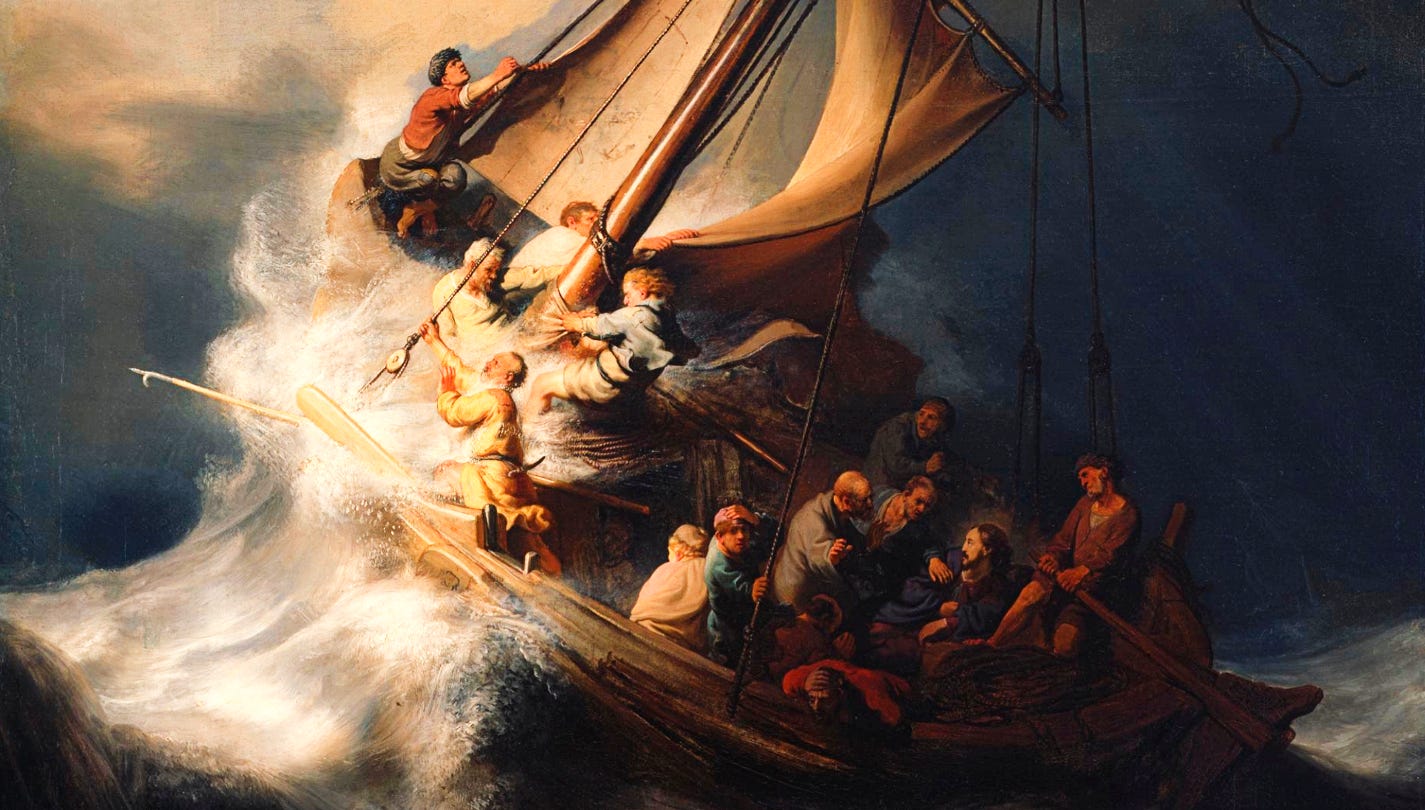
While writing a story recently about a harbor plagued by petroleum spills, I was reminded of being a kid and reading about mariners using oil to help survive offshore storms. It was the 1960s, so the magazine might have been in Yachting before it transmogrified into the sop to billionaires it is today.
“Storm oil” could be deployed upwind in a container attached, for example, to a sea anchor, from which it slowly released its contents. Like nutmeg on butternut squash, storm oil was effective even when applied in tiny amounts.
And, as the painting above was meant to suggest, the technique has been used since biblical times (the Sea of Galilee is notoriously subject to sudden violent wind-driven waves). As recreational boating was trending upward in the last century, boating magazines were launched to serve the new market, and one service to readers was to pass along wisdom of professional mariners.
One early magazine account of storm oil appeared in this issue of Motor Boating, known for it’s stunning cover art:
This “heavy weather edition” of the June 1912 magazine credited the Phonecians with first use of storm oil: Sailors from the ancient Middle Eastern nation had observed “that after passing through the wake of whales, oil exuding from their bodies left a perfectly calm spot” (presumably referring to the bodies of the whales, not the sailors).
The following bits of wisdom were contributed to Motor Boating by E.A. Crawford of Newark, N.J.:
As soon as the oil spreads on the surface of the water, it places a film over it, which effectually prevents the waves from coaming and breaking. Of course, it has no effect on the swell.
Three bags should be sufficient for a boat as they may be constructed in any manner desired, although the usual shape is cylindrical about six inches in diameter, of two or more thicknesses of heavy canvas. Stuff with oakum and punch full of holes at least a quarter of an inch in diameter to allow the oil to leak out, which is easily done with a marlin spike.
These holes also admit the water, so it can facilitate the oil leakage and make it more uniform. Saturate the oakum with lard oil, if obtainable, as experiments tend to favor it to all others. Still most any oil will serve in an emergency, although mineral oil, having little fatty matter will not produce as good result as vegetable oil, while lard oil being composed entirely of fat is most effective…
If riding to a sea anchor, bend them to the cable, so it will be several fathoms ahead of the boat. Running before the wind, tow one from each bow, using enough line on them so they will always be in the water. At anchor, make one fast to the cable several lengths ahead of the boat, allowing sufficient line so it will float freely.
Cone Can in a Sea Anchor
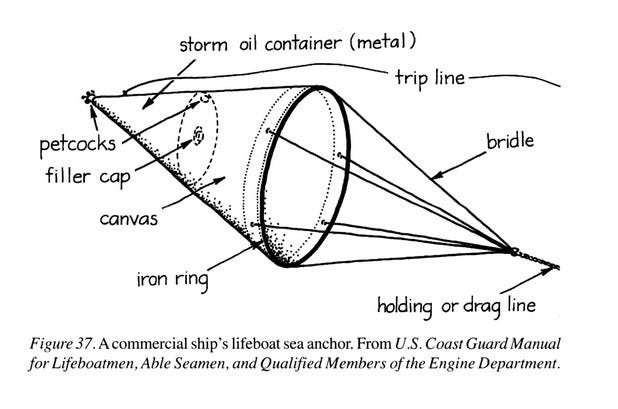
Attached to a Kellet
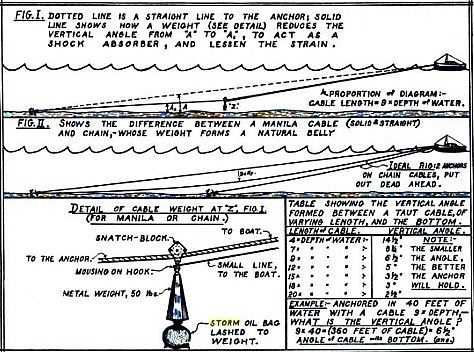
Storm Oil Bags
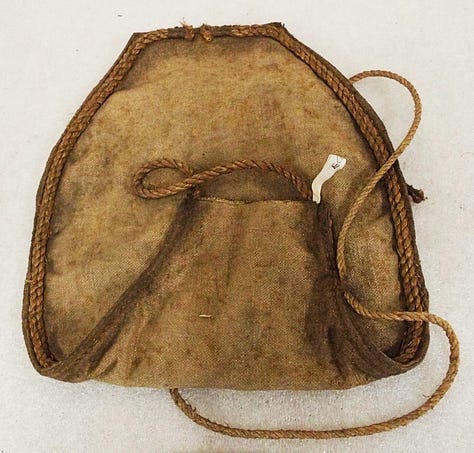
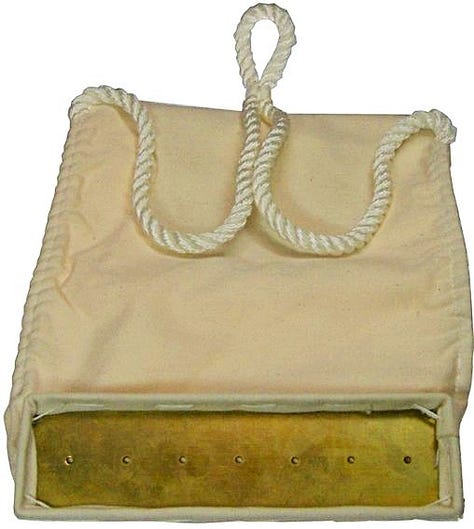
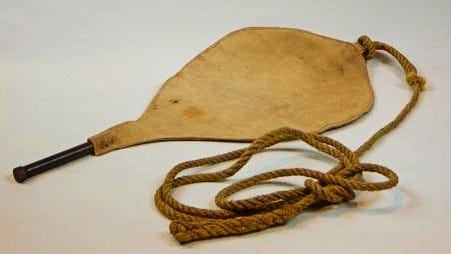
The final reference to storm oil that I could find in MotorBoating (the name had become one word) was a 1978 story about a 70-foot sailing vessel lying ahull. She was apparently surfing down massive waves and outrunning the slick until her crew began towing warps to slow the boat down enough to enjoy the effects of the oil.
Benjamin Franklin
There he goes again. Research a topic long enough, and sooner or later Benjamin Franklin is going to pop up. It wasn’t enough that he invented lightning rods, swim fins and bifocals, that he was first to chart the Gulf Stream, but it was Franklin that first confirmed scientifically the efficacy of storm oil.
Sailing to England in the 1760s, Franklin observed that the greasy galley discharge from a nearby ship smoothed its wake. After arriving he conducted experiments at a British lake, which he summarized in a report on “Stilling the waves,” writing:
“Not more than a tea spoonful produced an instant calm, over a space several yards square, which spread amazingly, and extended itself gradually till it reached the lee side, making all that quarter of the pond, perhaps half an acre, as smooth as a looking glass.”
This YouTube guy replicated Franklin’s approach and gives a pretty good explanation of the science involved. He even used olive oil, as likely had the early Phonecian practicioners.
The Federal Water Pollution Control Act was enacted in 1948, but rewritten in 1972 and amended twice since. For boaters, one result was the placard below, which we are all required to display on vessels 26 feet and over with an enclosed engine compartment.
But what if a vessel is outside U.S. waters entirely? Todd Lochner, an admiralty lawyer in Annapolis, was asked whether restrictions on releasing oil follow us onto international waters, which is where we are most likely to have to ride out a storm.
The short version is that there are laws which are applicable to both U.S. territorial waters, and generally speaking, there are laws which will follow the flag state of the vessel. Let's not forget that there are certain treaties like UNCLOS1 which will apply, particularly if the flag state is a signatory as well. As usual, clear as mud with a lawyer response that I need more information and factual scenario, etc. etc.
As late as 1991, “Chapman Piloting & Seamanship & Small Boat Handling” was still informing readers of the benefits of oil in the storm but with a disclaimer about it’s dubious legality. In 1999, the first edition of “Surviving the Storm: Coastal & Offshore Tactics” by Steve and Linda Dashew only mentions storm oil a few times in passing.
No matter, I think. If given a choice between adding a couple quarts of Rotella T to the Atlantic and death by drowning, most of us would probably choose the former. The law and politically correctness may be why none of our written authorities are touting oil as a solution nowadays, but the real reason for its disuse is this: We now have tools to avoid being caught in storms, which did not exist before the 1990s, let alone 1912.
Better Forecasts
Ocean-crossers like the Dashews are a rare breed. Many of us haven’t done anything riskier than an overnighter. Most offshore passages are limited in duration to four, maybe five or six days. Think “I-65,” the route from New England to the Caribbean via Bermuda.
Weather forecasting for a four-day window is actually pretty damn accurate nowdays, and, since the new Millenium, the electronic means for receiving such forecasts have proliferated, the latest and greatest being Starlink. We’re not getting surprised like we used to.
Think of it this way: The conditions for using storm oil and a sea anchor are pretty much the same, as suggested by one of the illustrations above. Yet the sea anchor has become like a vestigial tail. Many of us still carry one, but most of us who do, have never used it.
If you’ve deployed a sea anchor in actual storm conditions, please share the story with us below. Do you think oil would have helped?
United Nations Convention on Law of the Sea.




In the Book of Internal Combustion, verse 10W30, Rocco layeth his hands upon a barrel and said, "Behold! I have a barrel!" And Jesus raised his eyes and said unto Rocco, "Yes, Rocco, we can all see that. So what?" And Rocco said, "We shall pour the cooking oil in this barrel over the sides of this boat, into the raging water, and it shall calm the seas!"
"Really? sayeth Jesus. "I thought I was the only one who could do stuff liketh that." And Rocco sayeth, "Yea, verily, if thou art going to use that hocus-pocus that thou doest all the time, we shall be in for a full night of rough seas, with all the pains thereineth, including the banging of the heads, the churning of the stomachs, and the tossing of the salads!"
Jesus spake simply: "Meh."
And Rocco the Mechanic and his assistant Irving did lifteth the heavy barrel of oil up to the bulwark of the boat, and the barrel did slippeth out of the hands of the two and falleth into the churning waters. And it appeareth that the barrel - fully laden with the cooking oil - did plummet into the depths of the ocean.
And the stormy seas raged on into the dark night. And all on board were ill, with none more so than Jesus, who leaned over the side and delivered up several loaves and fishes he had consummeth earlier in the day, for brunch.
And Roxy, a steward woman of the boat's crew said, "Well... that barrel had the last of the oil! Even if we had more loaves and fishes, we ain't got nuttin' to cook 'em in!" And there was much griping and gnashing of teeth among both crew and passengers, and Rocco felt it a good idea to lay low for a while.
And Jesus spake, saying he wished to lie down, looking with raised eyebrow in the direction of Roxy. And Roxy sayeth, "Not with breath like that, J-Boy! Findeth thou a sprig of mint or parsley and get back to me."
And the sea continued to churn. And the oil was gone. And Jesus wept.
Pretty sure Jesus did not need a drop of oil to get things under control.